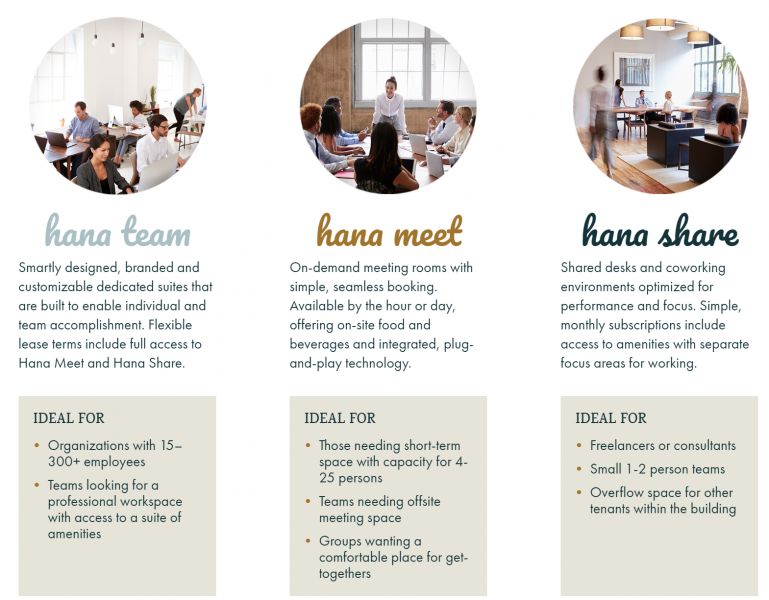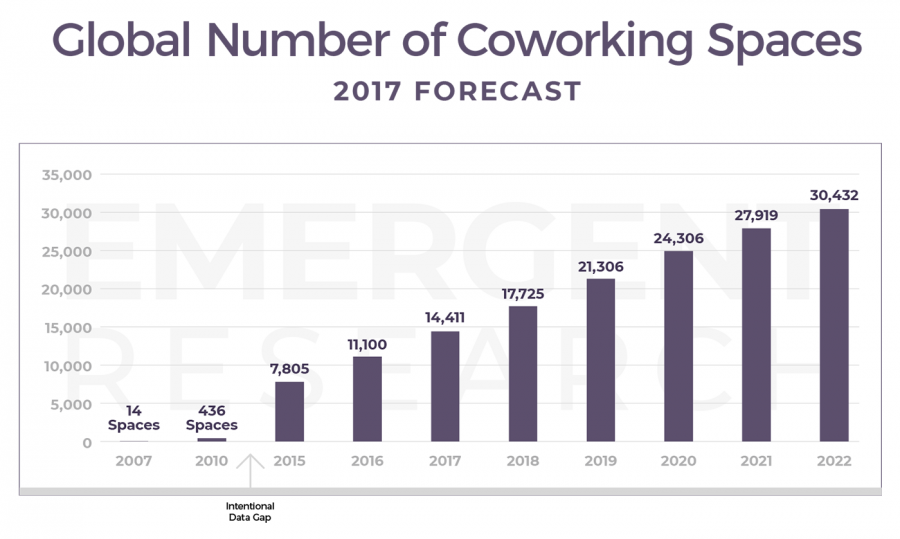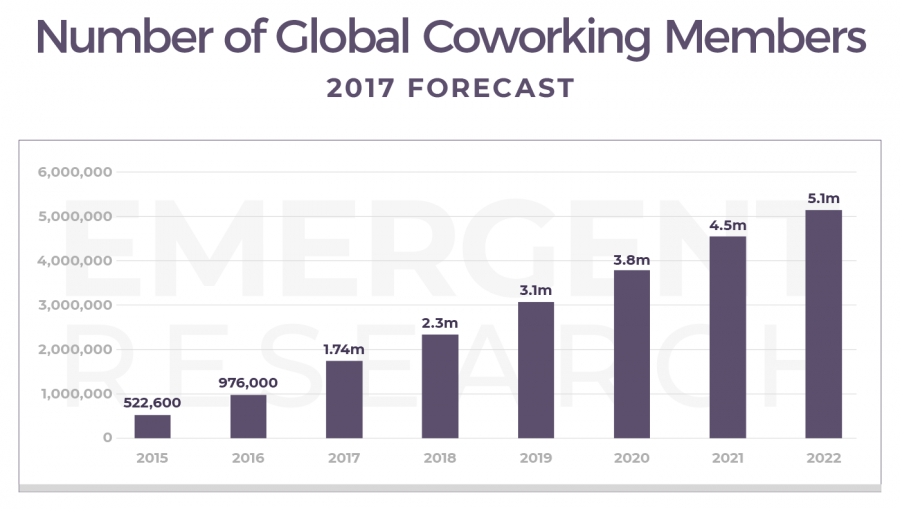

CBRE, the world’s largest global corporate real estate firm, recently announced the 2019 launch of Hana, a new service offering designed to help institutional property owners meet the rapidly growing demand for flexible office space solutions. Despite rapid growth over the past decade of the coworking sector, many have still dismissed the coworking concept as a fad. However, the statistics, including this move by CBRE, suggest that coworking is, in fact, the new normal.
- Shared workspaces have grown at an incredible rate of 200 percent over the past five years. In global cities like London, New York, and Chicago they are expanding at an annual rate of 20 percent, making coworking an institutional part of the market.
- According to the Wall Street Journal, in recent months, WeWork became the largest occupier in Manhattan, and had already achieved this status in Londonearlier this year.
- GCUC, the Global Coworking Unconference Conference, predicts that the number of global coworking spaces will grow from 14,411 in 2017 to just more than 30,000 in 2022, and that the global number of members will grow even faster than the number of spaces. Additionally, the organization expects the number of coworking members will grow from 1.74 million in 2017 to 5.1 million in 2022.
A Refreshed Take on the Shared Workplace
Hana’s core offering is called Hana Team, which provides private office suites that meet the needs of large corporate users of office space. Hana Team combines the benefits of flexible space with the amenities, technology, thoughtful space design, and control over branding and culture that sophisticated corporations require.
Each Hana facility also will feature two other integral offerings, Hana Meet and Hana Share. Hana Meet provides conference rooms and event space that can be rented on an hourly, daily, or weekly basis. Hana Share provides traditional co-working space in which users share services, amenities, and technology in a communal setting.
Launching officially in 2019, Hana will partner with institutional property investors who want to differentiate and enhance their assets by meeting the growing demand for flexible office space. Hana will design, build, and operate the facilities and services, and will participate in the financial success of each Hana facility. Hana is designed to provide property owners increased transparency, control over their asset environment, and a valuable offering for companies that desire to maintain their culture and brand while leveraging the benefits of a flexible space offering.
“The way space is being used is evolving rapidly,” said Bob Sulentic, CBRE’s president and chief executive officer. “Companies want the flexibility to adjust their occupancy to meet changing business needs and a better workplace experience to attract and retain top talent. Hana is perfectly suited to meet these needs. Reflecting this, we have already generated significant interest from building owners who are looking for a trusted partner to help deliver flexible space offerings, and have a robust deal pipeline.”

Spearheaded by A Diverse Team of Experts
Hana will operate as a wholly-owned subsidiary of CBRE and, beginning in 2019, will be the third component of CBRE’s Real Estate Investments business – along with investment management (CBRE Global Investors) and development services (Trammell Crow Company).
The Hana team is led by Andrew Kupiec, chief executive officer of Hana, who joined CBRE from Zipcar in 2017, and Scott Marshall, Hana’s president and chief development officer, who previously led CBRE’s investor leasing service line in the Americas. Kupiec’s deep background in consumer experience, technology, operations, and product marketing signifies the importance this service will place on the user experience while Marshall’s background in analytics will drive the company’s ability to stay on top of workplace trends.

Designed for the Modern Worker
Hana is uniquely positioned to acknowledge the fact that today’s modern working is anything but typical. Some workers need a full professional suite, complete with well-appointed spaces and the full gamut of amenities - Hana team is the logical solution for this need. Meanwhile, teams with short-term needs and smaller staff (4-25 employees) will benefit from Hana meet - a great service offering for start-ups. Lastly, Hana share addresses the needs of freelancers and consultants with shared desks and coworking environments. And while a 2017 study by Upwork and Freelancers Unionfound that “freelancers are expected to be the majority of the U.S. workforce by 2027, based on growth rates witnessed in the past year,” Hana doesn’t just address this growing freelance market, but instead it answers the need for flexible workspaces for the full spectrum of workers, from single freelance employees to entire companies of workers.
In his book, The Inevitable: Understanding the 12 Technological Forces that will shape our Future, author Kevin Kelly states, “We are moving away from a world of fixed nouns and toward a world of fluid verbs. In the next 30 years, we will continue to take solid things – an automobile, a shoe - and turn them into intangible verbs. Products will become services and processes... In the intangible digital realm, nothing is static or fixed - everything is becoming.” As we look at today’s workplace, the ability to envision physical workspace as a service has become the norm. Workplace isn’t just evolving from a noun to a verb, it’s already there. Now, our challenge will be our ability to adapt to the needs of workers with a refined service offering that not only addresses current needs, but also is adaptable as future trends drive new demands on our business.
This article was originally published in The Business of Furniture, a division of Bellow Press, on November 7, 2018. It is reprinted here with permission.
About the author: Amanda Schneider, LEED AP is a researcher, blogger for the Huffington Post, and the founder of ThinkLab www.thinklab.design, a research led strategy firm serving the contract interiors market.

